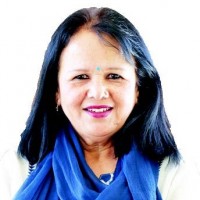Addressing The Issue Of Gender Violence


Indu Pant Ghimire / Saurav Raj Pant
Gender-based violence (GBV) disproportionally affects women & girls in particular. According to 2013 global review, one out of three women has experienced either physical and sexual intimate partner violence or non-partner sexual violence. Still, violence against women is accepted as normal and the global culture of discrimination against women allows to occur with impunity. In Nepal, there are a number of laws to curb atrocity and violence against women. Despite the progressive laws and policies, women and girls are socialised to be silent and made responsible to maintain family honour. Most of the cases of GBV are under-reported and settled within community. This further escalates GBV and emboldens the culprit.
There is high impunity and violence against women and girls under the pretext of its traditional and cultural value. According to Nepal Demographic Survey 2016, 66 per cent of women who have experienced physical or sexual violence have not sought help, nor have they shared their experiences. According to the study conducted in 2012 by the Office of the Prime Minister; it has been found out that 61.3 per cent of women were unaware of any laws that address GBV. However, 24.8 per cent of women were aware of services available to the survivors of GBV, 5.6 per cent knew about shelter homes at district level, 6.1 per cent of women are aware about the desk at the District Coordination Committee that handles GBV cases. Five per cent of women knew about the women cell in district police office and only 7 per cent were aware that there is a GBV-focused District Resource led by the Chief District Officer (CDO).
Underlining 2019 theme of 16 Days of Activism; rape has been one of the worst GBV meted out against women. In 2018 report released by Nepal police, it has been found that 1,480 incidents of rape were reported in 2017, almost double the number from 2016. Teenage girls and minors have been the victim of the rape and generally the perpetrators are close persons. In 163 cases out of 689 documented cases in 2017, the main perpetrator was a family member or relative. The intersection of the violence, crime and conflict magnifies the violence against women. Rome Statue of the International Criminal Court (ICC) that came into force in 2002 challenged the previous norms and values related to sexual violence against women. More than 1.5 billion women live in fragility, vulnerable to genocide, war, crimes and refugee camps continuously put women in threats.
Globally, various forces are increasing the risk of GBV for women. Refugees are shifting from rural to urban locations seeking for better opportunities. During these shifts many women are reported undergone severe GBV. For example in Balukhali makeshift settlements in Cox’s Bazar of Bangladesh, almost every woman and girl in the refugee camp is either survivor of or a witness to multiple incidences of sexual assaults like rape, gang rape, burning alive and murder.
Climate Change is posing threats to the environment causing food insecurity as well as gender vulnerabilities as a cross cutting issues. For instance, the collapse of the legitimate markets for products and services as well as destruction of forests by illegal loggers have led majority of women out of traditonal occupation, resulting towards economic degradation and sexual violence. Massive flow of migrants to Europe and the US from war-torn countries of Africa and Asia has created a humanitarian crisis. In Syrian war, brutal practices of stoning of women and girls to death on charges of adultery are common. There are cases of executing sexual minorities by throwing them off building, lashing for violating dress code, and forced marriage of Sunni girls and women to IS fighters.
GBV has to be addressed by sound functioning and coordination of the One Stop Crisis Management Center(OCMC), Social Protection Fund, women police personnel at every district police office, school based sexual health programme, high level GBV unit at the Office of the provincial governments, Prime Ministers and Council of Ministers, Legal Aid and psychosocial counseling. There is the need of localised GBV policies in local units, meaningful engagement of women and multi-sectoral approach in addressing the GBV issue.
Nepal has progressive laws and policies but weak implementation and unchanged public mindset, which has obstructed the access to justice for women. It is crucial to address the deeply entrenched social stereotypes by engaging men, boys and women in networking and collective action. Men and boys are one of the important stakeholders in this process and also have a power to influence.
(Indu is the president of Ujyalo Foundation & Saurav is a researcher.)
Recent News

Do not make expressions casting dout on election: EC
14 Apr, 2022
CM Bhatta says may New Year 2079 BS inspire positive thinking
14 Apr, 2022
Three new cases, 44 recoveries in 24 hours
14 Apr, 2022
689 climbers of 84 teams so far acquire permits for climbing various peaks this spring season
14 Apr, 2022
How the rising cost of living crisis is impacting Nepal
14 Apr, 2022
US military confirms an interstellar meteor collided with Earth
14 Apr, 2022
Valneva Covid vaccine approved for use in UK
14 Apr, 2022
Chair Prachanda highlights need of unity among Maoist, Communist forces
14 Apr, 2022
Ranbir Kapoor and Alia Bhatt: Bollywood toasts star couple on wedding
14 Apr, 2022
President Bhandari confers decorations (Photo Feature)
14 Apr, 2022











